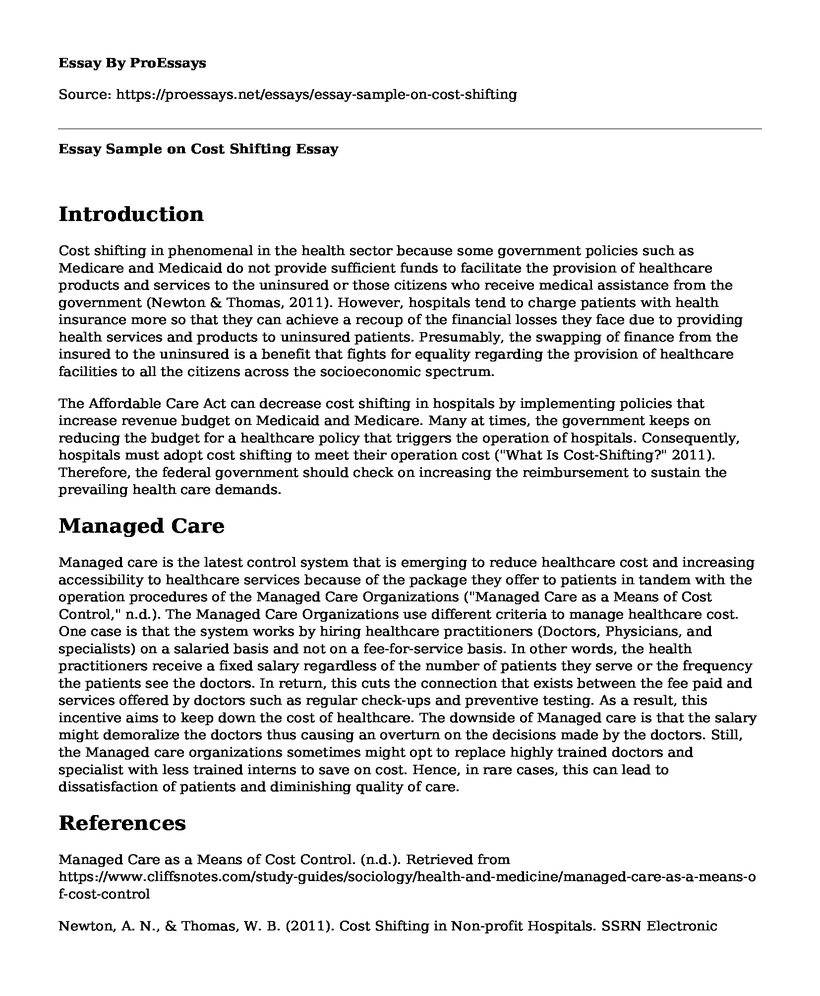Introduction
Cost shifting in phenomenal in the health sector because some government policies such as Medicare and Medicaid do not provide sufficient funds to facilitate the provision of healthcare products and services to the uninsured or those citizens who receive medical assistance from the government (Newton & Thomas, 2011). However, hospitals tend to charge patients with health insurance more so that they can achieve a recoup of the financial losses they face due to providing health services and products to uninsured patients. Presumably, the swapping of finance from the insured to the uninsured is a benefit that fights for equality regarding the provision of healthcare facilities to all the citizens across the socioeconomic spectrum.
The Affordable Care Act can decrease cost shifting in hospitals by implementing policies that increase revenue budget on Medicaid and Medicare. Many at times, the government keeps on reducing the budget for a healthcare policy that triggers the operation of hospitals. Consequently, hospitals must adopt cost shifting to meet their operation cost ("What Is Cost-Shifting?" 2011). Therefore, the federal government should check on increasing the reimbursement to sustain the prevailing health care demands.
Managed Care
Managed care is the latest control system that is emerging to reduce healthcare cost and increasing accessibility to healthcare services because of the package they offer to patients in tandem with the operation procedures of the Managed Care Organizations ("Managed Care as a Means of Cost Control," n.d.). The Managed Care Organizations use different criteria to manage healthcare cost. One case is that the system works by hiring healthcare practitioners (Doctors, Physicians, and specialists) on a salaried basis and not on a fee-for-service basis. In other words, the health practitioners receive a fixed salary regardless of the number of patients they serve or the frequency the patients see the doctors. In return, this cuts the connection that exists between the fee paid and services offered by doctors such as regular check-ups and preventive testing. As a result, this incentive aims to keep down the cost of healthcare. The downside of Managed care is that the salary might demoralize the doctors thus causing an overturn on the decisions made by the doctors. Still, the Managed care organizations sometimes might opt to replace highly trained doctors and specialist with less trained interns to save on cost. Hence, in rare cases, this can lead to dissatisfaction of patients and diminishing quality of care.
References
Managed Care as a Means of Cost Control. (n.d.). Retrieved from https://www.cliffsnotes.com/study-guides/sociology/health-and-medicine/managed-care-as-a-means-of-cost-control
Newton, A. N., & Thomas, W. B. (2011). Cost Shifting in Non-profit Hospitals. SSRN Electronic Journal. doi:10.2139/ssrn.1953837
What Is Cost Shifting? (2011, September 17). Retrieved from http://smallbusiness.chron.com/cost-shifting-23849.html
Cite this page
Essay Sample on Cost Shifting. (2022, Jun 23). Retrieved from https://proessays.net/essays/essay-sample-on-cost-shifting
If you are the original author of this essay and no longer wish to have it published on the ProEssays website, please click below to request its removal:
- The Legal Framework of International Investment Protection
- Coursework Example on Advertising Budget
- The Budget Reconciliation Act of 1993 Essay
- Funding and the World Bank Essay
- Paper Example on Rise in Interest Rates: Challenges for Healthcare Organisations
- My Truck Shopping Adventure: Negotiating the Best Price - Report Example
- Wells Fargo - Case Study Sample







